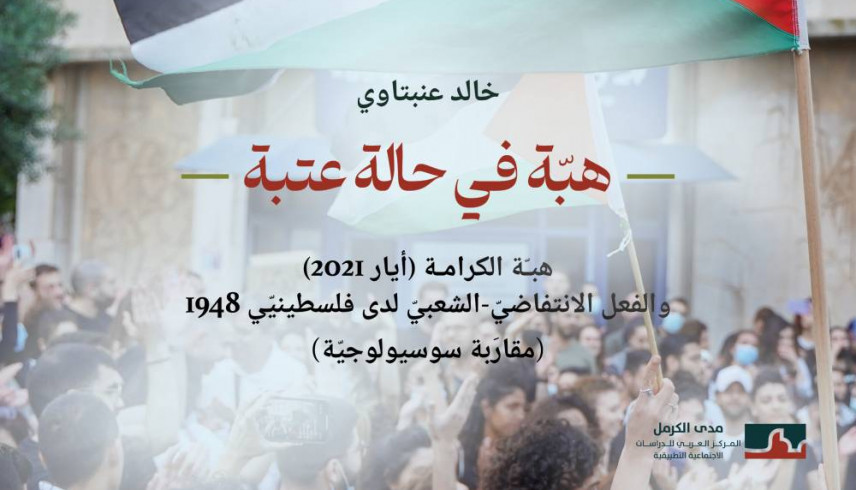
Mada al-Carmel: The Arab Center for Applied Research announces the publication of a new book entitled, “Uprising Amidst Liminality: The Karamah [Dignity] Uprising of May 2021 and Popular Insurrectionary Action Among Palestinians Within the ‘Green Line’ – A Sociological Perspective”, written by researcher Khaled Anabtawi. The study, which spans 161 pages, investigates the defining characteristics of the Karamah Uprising, which broke out in May 2021 against the backdrop of events surrounding the storming of the Al-Aqsa Mosque by Israeli forces, and Israel’s attempts to evict and uproot Palestinian residents from the neighborhood Sheikh Jarrah in Jerusalem. The uprising also came in opposition to Israel’s subsequent offensive against the Gaza Strip on the evening of 10 May 2021, as well as to attacks carried out by Israeli settlers against Palestinians inside the ‘Green Line’, particularly in the so-called ‘mixed cities’.
Based on the author’s understanding of the uprising, its nature and contributing factors, the study seeks to comprehend the social, economic and political shifts that have taken place within the Green Line, and how these influenced the course of the uprising. It argues that the uprising constituted a crossroads and point of convergence for dialectical transformations that have occurred over the last two decades at the levels of: the Israeli regime and Zionism, Palestinian society within the Green Line, and the Palestinian issue in general.
The study contends that the aforementioned transformations helped shape the distinctive features of the uprising, be it in terms of its geographic reach, the makeup of its leadership, the form of its events and its rhetoric, or the style of its organization and the role played by organized political movements. In other words, it assumes that studying the uprising and associated shifts offers a gateway to understanding that transcends the temporal limits of the event itself.
The first chapter sets forth an epistemological and theoretical framework for the sociology of social movements in general, and in the context of Palestine in particular, which is beneficial for the study of collective, popular struggle/movement/action during uprisings by Palestinians within the Green Line. The second and third chapters provide an analysis of the events of the Karamah Uprising based on the theoretical outline given in the first chapter. The second chapter seeks to conceptualize the political-social moment as a socio-political context within which the uprising developed, especially considering recent transformations that have taken place within Zionism and the Israeli regime, as well as profound socio-economic shifts that have taken place within Palestinian society in the 1948 territories. The third chapter then probes the features and expressions of the uprising, and its political and social implications within these territories.
The book makes a contribution to the intellectual and political debate on the sociology of Palestinians within the ‘Green Line’, and on the sociology of their social movements and popular insurrectionary action, and within the broader settler-colonial setting.
Khaled Anabtawi is a researcher at Mada al-Carmel and a PhD candidate in Sociology and Anthropology at the Geneva Graduate Institute. His research interests center on the sociology of identity and space in the settler-colonial setting. His works have been published in numerous academic and cultural platforms. They include a study on the Karamah Uprising published in the Omran journal for social sciences, a study on “Palestinian Christians under Israeli Rule” published by Wipf and Stock Publishers and the Dar al-Kalima University, a study on “Israel and American and World Jewry” published by the Institute for Palestine Studies, and a study on the Balfour Declaration published in the Qadaya Israeli Affairs Journal, among others.
To mark this publication, Mada al-Carmel, the Arab Cultural Association, and Baladna – Association for Arab Youth are organizing a seminar to launch the book, titled, “On Political Action and Submission: The 1948 Palestinians between the Karamah Uprising and the War of Genocide”. The seminar launching the study comes three years after the Karamah Uprising and 11 years since the uprising against the Prawer Plan, and takes place amid Israel’s current assault and genocidal war against the Gaza Strip. It will discuss the state of political action and struggle in 2021, in light of the state of silence prevailing today. The study provides numerous insights and lessons that may facilitate understanding of concerns and ideas about the current situation of Palestinians within the Green Line, even though the study was written before the war of genocide on Gaza started.